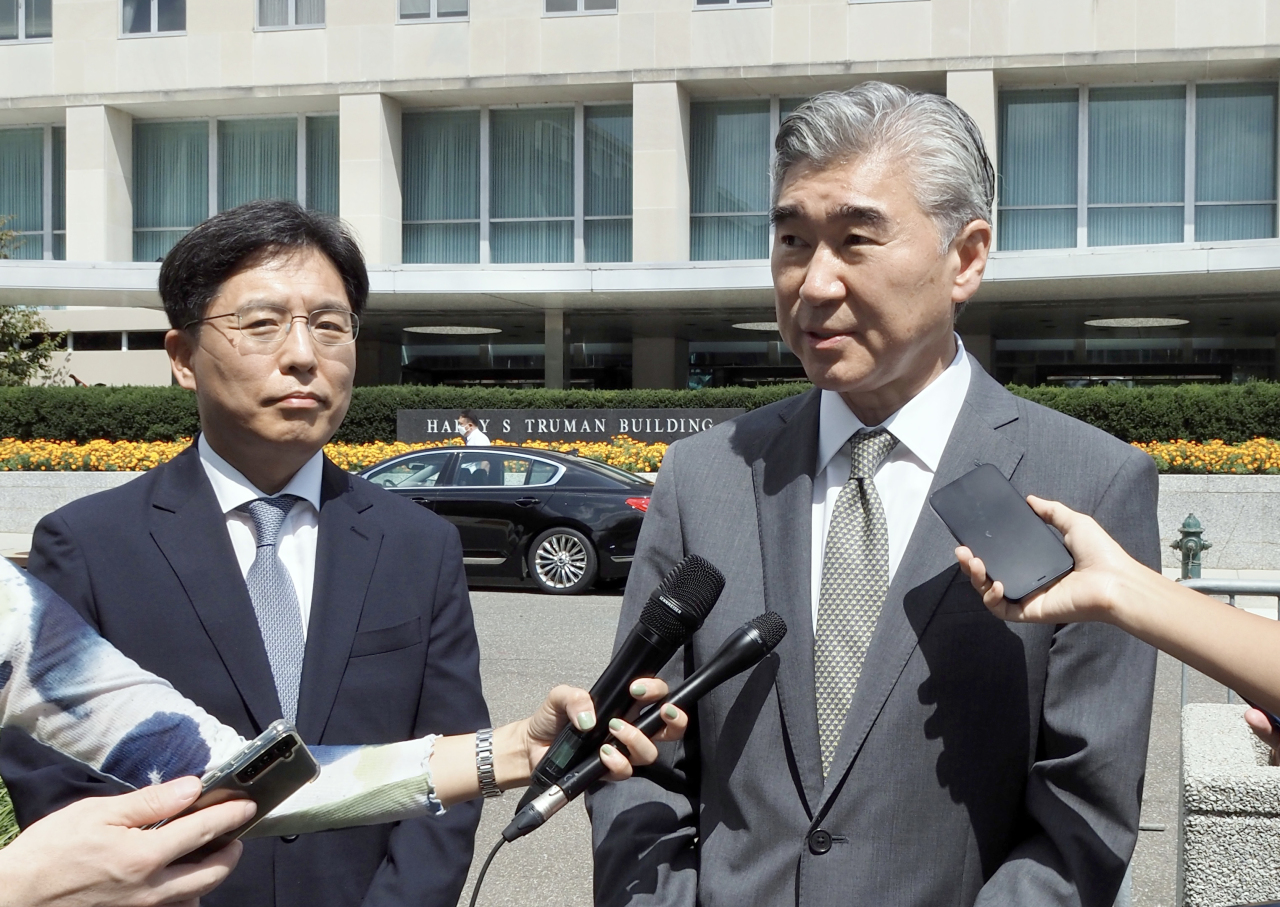S. Korea, US envoys discuss humanitarian aid for NK, nuclear issue
By Ahn Sung-miPublished : Aug. 31, 2021 - 14:52

South Korea and the US discussed potential humanitarian aid to North Korea and reiterated calls for the reclusive regime to return to dialogue, Washington’s top nuclear envoy said Monday, as Pyongyang may be on track to expand its nuclear program.
Sung Kim, the US special representative for North Korea, made the remark after a meeting with his South Korean counterpart, Noh Kyu-duk, who is in Washington through Wednesday for talks with officials at the State Department and the White House National Security Council.
“We exchanged views on the situation on the ground, as well as some ideas and initiatives for engagement, including possible humanitarian assistance,” Kim told reporters after the meeting. “We also, of course, reaffirmed our shared commitment to pursuing the complete denuclearization of the Korean Peninsula through diplomacy, and I look forward to hearing back from the DPRK.”
DPRK refers to the North’s official name, the Democratic People’s Republic of Korea.
Noh said the two sides held follow-up discussions to previous consultations on areas of humanitarian assistance to the North, as well as inter-Korean cooperation.
The two envoys previously met just last week, when Kim visited Seoul for talks with officials here. During his stay in Seoul, the two sides discussed ways to provide humanitarian assistance to the North, while Kim reaffirmed a willingness to meet his North Korean counterparts “anywhere, at any time.”
Their meeting in Washington also came as the International Atomic Energy Agency said the North appears to have restarted operations at its main Yongbyon nuclear reactor in July, raising the alarm that the regime could be expanding its nuclear program.
The Korean envoy said the two sides agreed that the North’s nuclear issue is an “urgent issue” that needs to be resolved quickly through diplomacy and dialogue.
“Based on close coordination with the US, the South Korean government has continued to monitor activities related to the North’s weapon of mass destruction,” said Noh.
The apparent resumption of activities at the North’s key nuclear complex poses major challenges to the Biden administration’s goal of denuclearizing North Korea and the Moon administration’s stalled peace process.
The sudden resumption of the inter-Korean hotlines in July -- after a yearlong halt -- raised hopes for a breakthrough in inter-Korean ties as well as improved US-North Korea relations. But the North has been unresponsive on the communication channels since early in August, in an apparent protest of the joint military drills that ended last week.
“We continue to seek dialogue with the DPRK so we can address this reported activity and the full range of issues related to denuclearization,” White House press secretary Jen Psaki said Monday in regards to the IAEA’s report. “This report underscores the urgent need for dialogue and diplomacy so we can achieve the complete denuclearization of the Korean Peninsula.”
Denuclearization talks stalled during the Trump administration after the collapse of the Hanoi summit in 2019, when then US President Donald Trump rejected Kim Jong-un’s offer of major sanctions relief in exchange for North Korea’s denuclearization. Since then, inter-Korean ties have also remained at a standstill.
Washington has reached out to Pyongyang since the Biden administration began early this year, but the regime has rebuffed their diplomatic overtures.
Pyongyang has signaled it will expand its nuclear program if the US does not withdraw its “hostile policy” toward the North, an apparent reference to US-led sanctions.



![[Exclusive] Korean military set to ban iPhones over 'security' concerns](http://res.heraldm.com/phpwas/restmb_idxmake.php?idx=644&simg=/content/image/2024/04/23/20240423050599_0.jpg&u=20240423183955)

![[Graphic News] 77% of young Koreans still financially dependent](http://res.heraldm.com/phpwas/restmb_idxmake.php?idx=644&simg=/content/image/2024/04/22/20240422050762_0.gif&u=)



![[Pressure points] Leggings in public: Fashion statement or social faux pas?](http://res.heraldm.com/phpwas/restmb_idxmake.php?idx=644&simg=/content/image/2024/04/23/20240423050669_0.jpg&u=)










